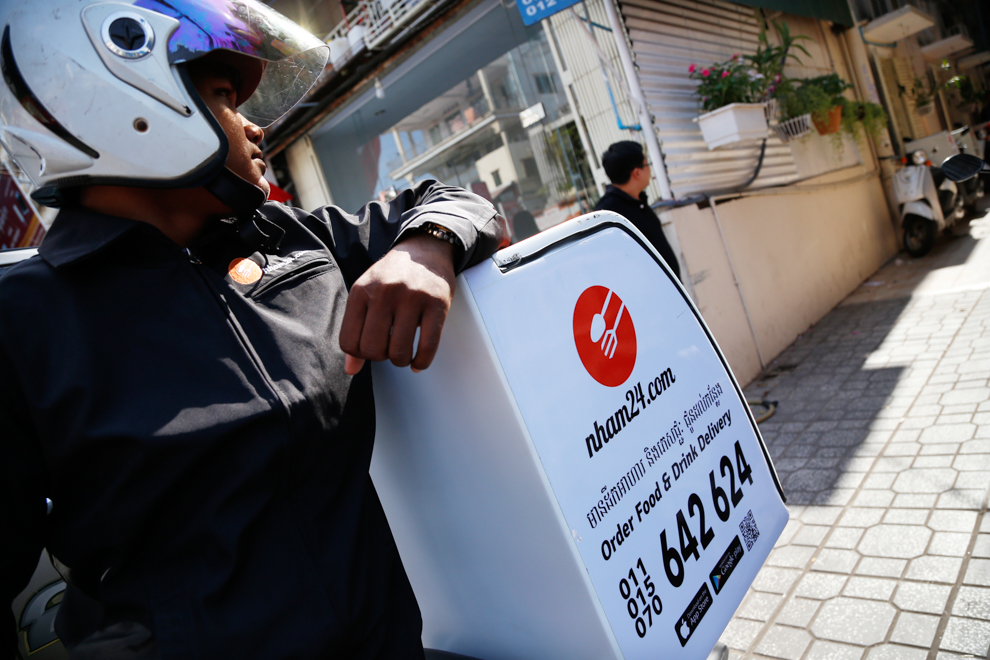
A Nham 24 delivery driver rests on his scooter before making a food delivery on Tuesday in Phnom Penh.
Cambodians and expats in the Kingdom’s biggest cities are increasingly finding convenience in using their computers or smartphones to order food and drinks to their homes and workplaces, fuelling demand for online meal delivery platforms.
The field has grown in the five years since Your Phnom Penh launched as the Kingdom’s first website that allowed customers to view local restaurant menus and place orders. Meal Temple launched its own platform in 2013, and Nham 24 entered the ring early last year – while several others, including international giant Foodpanda, are eyeing the market.
Antoine Pichery, business development manager of Meal Temple, which also publishes booklets containing restaurant menus, said the company has expanded rapidly during its four years of operation. Last year it grew by 70 percent after doubling its size in 2015.
“Today, there are more than 30 employees as well as 20 to 25 drivers depending on shifts, and we have 288 restaurants listed in Phnom Penh, Siem Reap and Sihanoukville,” he said.
Pichery said brand visibility and reputation were key elements to the company’s success.
“Firstly, the delivery drivers in the street are one of the biggest assets for delivery services because they are very visible to consumers and raise brand awareness,” he said. “The second thing is word-of-mouth, when people talk to their friends about ordering food and show that the service is good.”
According to Pichery, Meal Temple’s revenue comes from a monthly commission charged to all listed restaurants, in addition to advertising income and a 15 percent fee collected on every delivery. While other meal delivery services are turning to fully digital platforms, the company’s print distribution feeds into its online business.
“We distribute the booklets to universities, embassies, serviced apartments and hand them out with orders, and it works impressively well,” he said. “This is a competitive advantage for us because it brings in a lot of new clients and it is also a good source of revenue with advertising.”
Pichery still sees plenty of room to grow. He said Meal Temple is focusing on expanding early morning coffee deliveries and adding more restaurant listings in the capital’s rapidly developing Tuol Kork district. The company also plans to launch a grocery delivery service by the end of the month.
“There are around 2,000 restaurants expected to open in Phnom Penh by 2020, and I think this will cause the meal delivery service to keep growing,” he said.
But the number of online ordering platforms is also increasing. Pichery expects three or four additional players will enter the market this year, though not all will survive.
“I think that this market can only handle two or three players that are profitable, not more,” he said. “But I think if more players come in, it will expand the consumer base and make people more aware of meal delivery services, which is a good thing.”
Nham 24 founder Chann Borima recalled the challenge his online meal ordering platform faced when it went up against two established players last year.
“For the first few months it was painful, there were no orders,” he said. “We opened the office at 8 am and closed at 9 pm, and there wouldn’t be a single order.”
One year on, the company has managed to carve out a niche. It now registers around 200 orders a day and has hired 20 drivers to handle the constantly growing traffic from its 220 restaurant partners.
Borima said Cambodian customers, part of a growing and tech-savvy middle class, were essential to Nham24’s early growth and currently make up about 60 percent of its customer base. But securing orders required effective marketing through the company’s restaurant partners as well as a positive customer experience that led to word-of-mouth recommendations.
“The demand is there, but we need to make sure that the customers of popular restaurants know that they can order delivery from us,” he said.
Having secured its foothold in online meal deliveries, Nham 24 is now looking to leverage its order platform for other essential items, including groceries, household goods and even laundry.
For restaurants, the growing popularity of online meal delivery is hard to ignore. Cocina Cartel, a popular Mexican restaurant in central Phnom Penh, is one of many restaurants that have listed on all three meal delivery platforms.
Sok Kosal, the restaurant’s general manager, said these online sites are a major source of business for his establishment, accounting for about a third of all sales. They also help advertise the restaurant to a broader range of customers.
“When restaurants are listed on meal delivery sites, everyone can go and look at their menu and people can see their logo and promotions,” he said.
Kosal said the urban lifestyle, with its rigid working hours and choking traffic, had created a ripe market for food delivery services. And that should translate into a solid future for online meal delivery services.
“I think meal delivery will become more popular, as people do not want to always leave their house and deal with traffic or parking when they get food,” he said.
Contact PhnomPenh Post for full article
SR Digital Media Co., Ltd.'#41, Street 228, Sangkat Boeung Raing, Khan Daun Penh, Phnom Penh, Cambodia
Tel: +855 92 555 741
Email: [email protected]
Copyright © All rights reserved, The Phnom Penh Post








